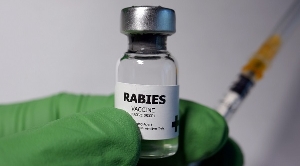The Ashanti Regional Director for Veterinary Practitioners, Dr Mabel Abudu, has revealed that the region recorded 15 suspected cases of dogs infected with rabies in 2023.
Out of the number, 11 tested positive for rabies, in the overall 17 dog bites in the region, Dr Mabel Abudu said.
Dr Mabel Abudu in an interview with Otec News reporters Nancy Boamaa and Juliet Tetteh on Tuesday, January 16, 2024, said “In 2023 the Kumasi Veterinary Lab received 15 cases of suspected dogs infected with rabies.”
“Eleven of the dogs tested positive to rabies disease, these dogs bit 17 humans, meaning one dog may bite more than one human and four dogs tested negative with one human involved,” she added.
Dr Mabel Abudu hinted that one positive case of rabies has only been recorded in the region as at January 15, 2024.
To curb the spreading of the rabies disease, Dr Abudu advocated for prosecuting those who fail to vaccinate their pets.
According to her, most pets in Ghana are easily infected by diseases such as rabies which can kill both the pet and human.
“When there is a prosecution for the offenders, people will vaccinate their pets and that will limit the spread of the disease to both humans and animals.” She advocated.
Dr Mabel Abudu then implored the public to vaccinate their pets against the rabies disease, because the disease kills.
Dr Mabel Abudu expressed concern about the fact that despite the dangers that rabies infection posed to humans and animals, some dog owners had refused to vaccinate their pets, threatening lives in their communities.
“We want people to be responsible for animals, because once you have decided to keep a pet or a dog, you need to keep them in a home, under a kennel or under chain, feed it, attend to its health needs by ensuring that it is well dewormed and vaccinated,” she advised.
Rabies
Rabies is a deadly viral disease of warm-blooded animals which is transmitted to humans through the bite or a scratch of an infected animal, resulting in fatal encephalitis (inflammation of the brain), nervous system disorder and death.
Because of the deadly nature of the virus, the World Health Organisation (WHO) has instituted September 28 every year as World Rabies Day to raise awareness of and make advocate for the elimination of rabies globally.
Rabies virus is usually spread from the saliva of infected animals such as dogs, cats, bats, coyotes, foxes, skunks and raccoons.
The symptoms of rabies include fever, headache, excess salivation, muscle spasms, paralysis and mental confusion. Animals most likely to spread rabies include dogs, bats, coyotes, foxes, skunks and raccoons.
Persons infected with rabies experience one or more symptoms such headache, neck pain, fever, nausea, fear of water, anxiety, abnormal tingling sensations or pain at the wound site. If not given prompt medical treatment, one can die from the disease.
Vaccination
To help improve the statistics nationally, Dr Mabel Abudu called on health workers to partner with Veterinary Services workers to encourage the public to vaccinate their pets, particularly dogs and cats.
He also appealed to health workers to cooperate with the service in treating dog bites at their facilities to ensure proper diagnoses and treatment.
He stated that every dog or cat was expected to be vaccinated with Anti Rabies Vaccine once a year, adding that the vaccination of an animal should be started three months after birth.
Health News of Tuesday, 30 January 2024
Source: otecfmghana.com
Ashanti region records 15 suspected rabies cases in 2023 - Veterinary Service
Opinions












